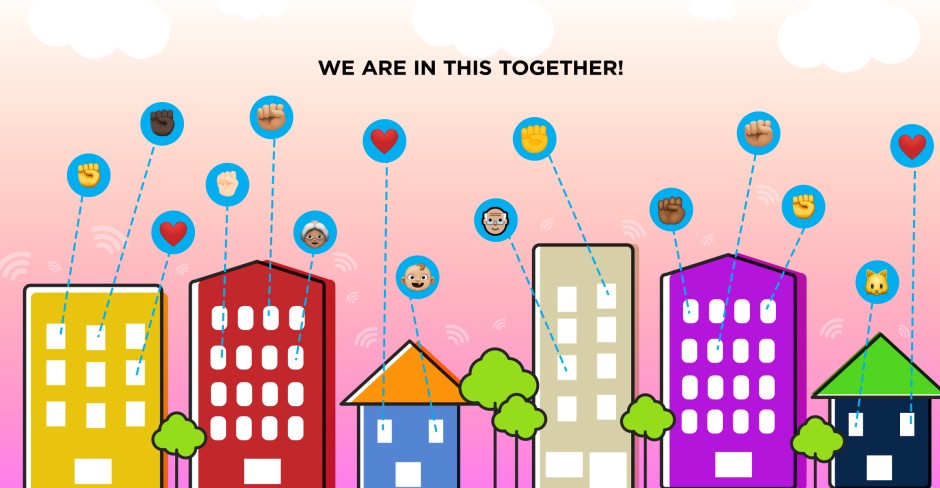Best practices for the Internet during COVID-19
We’re in this together: quick tips from OpenMedia to keep the internet safe, accessible and useful through the pandemic
Dear OpenMedia Community,
Like us, you’ve probably been following the developing news on the COVID-19 pandemic in the last few weeks with growing concern.
First things first: Please be sure to follow the latest medical advice from your local health authorities. Here are a few reliable resources, which contain up to date information:
As part of the OpenMedia community, you’ve helped us fight for better access to affordable Internet for years. Today, this crisis is seeing millions of us depending on those very Internet connections to a degree we've never seen before.
Whether it’s working from home, checking the news, seeking medical help, staying in touch with friends and family, or ordering key supplies, this basic service is essential for maintaining our health and connectivity.
We know that the Internet is going to be a critical tool for the weeks to come, and we wanted to share a few things that we can do as individuals, and that we can ask of ISPs and government, that will help make things a little bit better for everyone during this crisis.
What you can do as an individual:
- Don’t spread misinformation about the virus.If you read something astonishing online that you haven’t heard elsewhere, check it against a few respected news sources before sharing it. Scammers and conspiracy theorists take advantage of our anxiety at moments like this to hijack our communications to spread their messages; but false information can hurt people and sow unfounded fear. Check out PolitiFact’s 7 ways to avoid misinformation during the pandemic for more tips.
- Be considerate in your Internet use. With many organizations now working from home, way more people are going to be on home Internet during prime time hours – and your local Internet infrastructure may not always be up to the task. While you don’t need to give up Netflix, try to keep downloads to sleeping hours when people are less likely to be accessing essential services and information on the web. Unfortunately, this is particularly important in rural and remote areas, where communities are already struggling with insufficient connectivity.
- Stay connected to the most vulnerable people you know. It is people who already have health, mobility, and service access concerns who are most at risk during a pandemic. Take care of yourself and your family, and check in regularly with people you know in most need to make sure they are set up and cared for.
- Practice strong digital security. We already know that there’s an onslaught of COVID-19 related phishing and malware attacks. Plus, the more we’re working from home and spending time online, the more data and information we’re sharing with countless sources. Take a few minutes to review some resources from EFF to get you started in keeping your personal information secure.
What you can do as an Internet customer:
- Demand an end to data overage fees and throttling. Many ISPs (including Distributel, Bell, Telus, Rogers and Teksavvy in Canada, and AT&T, Comcast, and Verizon in the US) have already announced they will not be charging for data overage on home Internet, for at least the next few weeks. T-Mobile has also suspended mobile data caps. We’d love to see all providers of broadband and mobile Internet suspend data caps for the duration of the crisis. No one wants to see a repeat of the disregard for public welfare shown during 2018’s California wildfires, when Verizon was throttling the phone service of fire fighters.
- Ask for guarantees no one will be disconnected during the pandemic. Many people will be experiencing financial stress in the next few months, and may not be able to pay all of their bills on time. This cannot be allowed to cost them their access to the Internet, and the critical health updates that will be coming through it.
- Support additional steps to guarantee adequate basic service to all. Comcast and AT&T are offering 60 days of free Internet access in their urban hotspots; we’re encouraging other ISPs to follow suit, with this or other creative ideas for making their services freely accessible to everyone who needs it.
What you can do as a stakeholder in government:
- Demand public transparency. Much harm has been done in both China and the U.S. by the government concealing information from the public about the extent of the problem and the government’s slow response.
- Call for any unusual data collection to be necessary, proportionate, and time-limited. Sometimes the balance of individual rights and social welfare shifts during a pandemic. Different proposals need to be evaluated on their own merits, but emergency measures to contain the outbreak should be explicitly designed as such, and not become permanent expansions of government power. Our friends at EFF have put together a great guide to protecting civil liberties during a public health crisis that is a useful starting point for where to draw the line.
Like many of you, our team is now working from home to do our part to ‘flatten the curve’ of the pandemic. Things are running a bit differently, but we’ll continue to use the Internet to save the Internet, for weeks to come.
Over the next few days and weeks, we’ll be sending you more ways to take action, on the items above and more. We’ll also be watching for government overreach, advocating for better provision of access and protection of privacy from the private sector, and continuing the fight for our rights online.
Thank you for all the support you’ve shown us over the years to help defend and improve the Internet – more vital today than ever!
All the best on behalf of the entire OpenMedia team, and a few of our new colleagues:
Ferd and Vinny (colleagues of Rodrigo),
Ted (colleague of Victoria),
and Socks (colleague of Matt)





 Take action now!
Take action now!
 Sign up to be in the loop
Sign up to be in the loop
 Donate to support our work
Donate to support our work